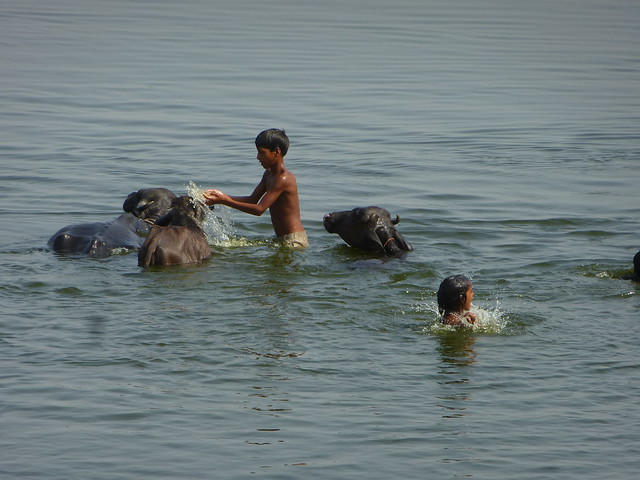Varanasi. That's where Mian and I are now, and on the left is the view from our balcony. See the splash of blue on the horizon? not the sky, the bit below that. That's the Ganga.
I should feel lucky to be here now. It is after all an old, old city on the banks of the Ganga. And even though I am not religious, atleast my traveling pulse should quicken at the thought of exploring this place. But it doesn't.
On the contrary, despite spending a decent amount of time here over the last two years, I still do not feel comfortable on my own here. I don't go out onto the ghats, don't eat street food, and infact, rarely go out. 'Does anyone say anything?' asks Mian often. 'Did you see something?'
No. It is not that. And it is difficult to explain, especially to Mian. He sees Varanasi the way I would like to. He appreciates the architecture, bonds with the people, and is moved by the music.

I , on the other hand, feel persecuted by the trash and the feral cows and the buffaloes. To me, the trash and the cows are not just inconveniences in themselves, but a result of what I dislike about Brahminical society. The cows for example. Hindus consider themselves to be vastly superior to other folks because they do not eat beef. They respect the Gau Mata, the mother cow. But the waste collection system in the prosperous, upper middle-class area that I live in failed because the residents refused to pay the charges. Instead, they drop the trash (including vegetable and fruit peel) on the road, tied in a plastic bag. The cows that they are 'too kind' to put down are starving and eat the trash, plastic and all. The result? Intestinal obstruction and death. To me, that is far worse than raising cattle for meat. And this is just one of the instances that make me cringe.
But I am writing this not to talk about Varanasi, but about myself. There was a time when like Mian, I could see the beauty in everything. Now I feel asif I am losing that. I see the ugly side to everything rather than the beauty. And both are present, of course. It is a matter of looking. I don't like this change. The ability to extract every drop of gladness from life has been what has kept me going always, it has almost been a definition of what chicu is. And now that seems to be going.
How do I tackle this? What do I do?


















































